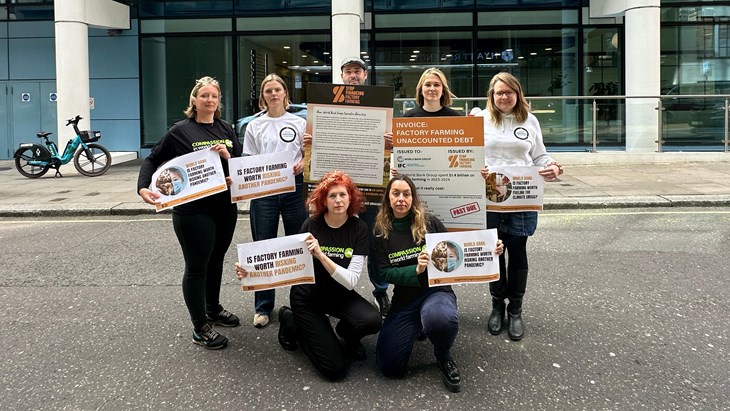
Today (24th April) we joined activists, researchers, and civil society leaders across five continents in a Global Day of Action against the World Bank Group. We had a simple message for them: stop financing factory farming.
A global movement
Coordinated by the Stop Financing Factory Farming (S3F) coalition, the actions shone a spotlight on the $1.4 billion the World Bank Group invested in industrial animal agriculture, between 2023 and 2024 alone.
The protests targeted World Bank and International Finance Corporation (IFC) offices in 13 cities worldwide - including Washington, New York, London, Bangkok, Bogotá, Medellín, Buenos Aires, Goma, Lagos, Rome, Mexico City, Quito and São Paulo.
The true cost of factory farms
We were at the World Bank’s UK headquarters in London to hand in a giant symbolic ‘invoice’, showing the true environmental, health, and economic costs of its factory farm investments.
The Global Day of Action took place just as the coalition exposed the true extent of the World Bank and IFC's unsustainable bankrolling. A new report revealed that, over the past five years, the IFC approved 38 loans worth roughly $2 billion to industrial meat, dairy, and animal feed corporations - without ensuring those clients met the IFC’s own climate requirements.
Undermining climate credibility
The coalition also presented an open letter signed by more than 280 civil society organisations, academics and leaders, including our Patron, renowned conservationist Jane Goodall, PhD, DBE, Founder - the Jane Goodall Institute & Messenger of Peace, and our Visionary, the philosopher Peter Singer, urging the World Bank to end support for factory farms and shift toward just, sustainable food systems.
Peter Stevenson, our Chief Policy Advisor, said: "We know that factory farms are bad for animals, while also destroying the environment and impacting human health – so why does the World Bank Group continue to support them? For as long as it bankrolls these unsustainable businesses, the World Bank is undermining its own climate credibility. Sustainable alternatives are out there. A shift to these would position the Bank as the sensible, forward-looking institution it should truly be."
